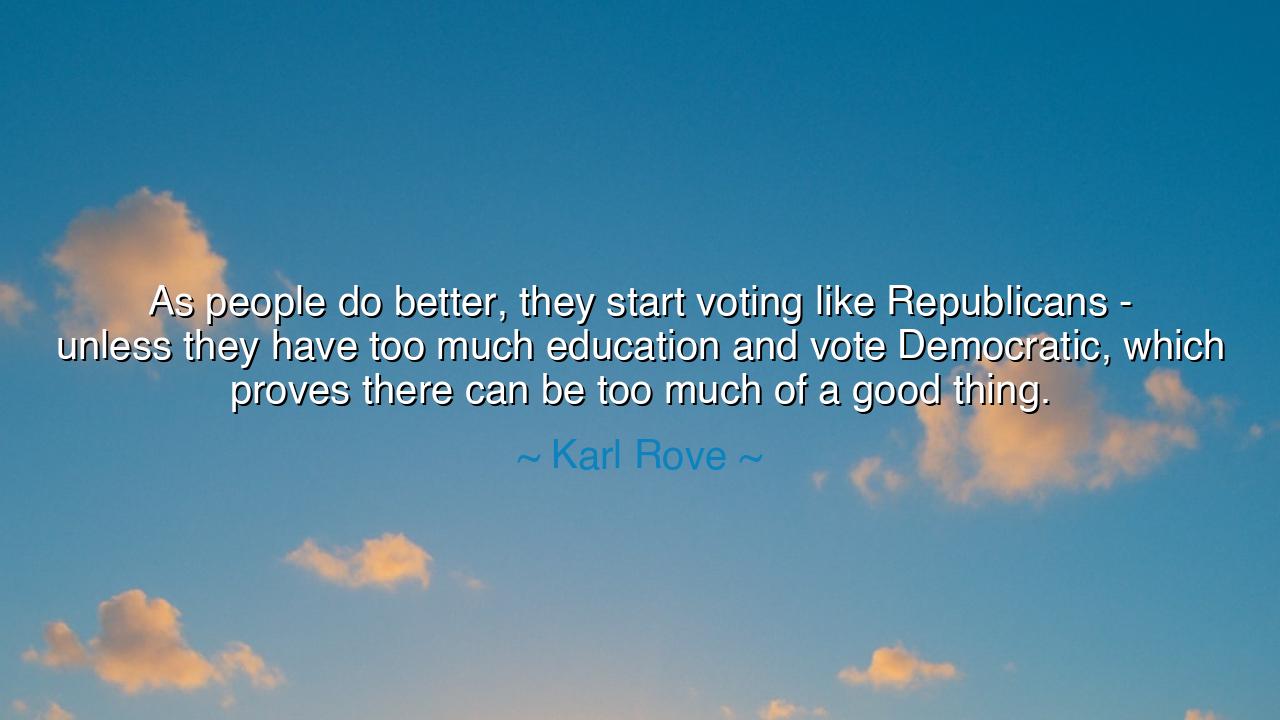
As people do better, they start voting like Republicans - unless
As people do better, they start voting like Republicans - unless they have too much education and vote Democratic, which proves there can be too much of a good thing.






Hear the words of Karl Rove, who declared with sharp wit: “As people do better, they start voting like Republicans—unless they have too much education and vote Democratic, which proves there can be too much of a good thing.” In these words lies both jest and judgment, but also a mirror held to the ways of society. For he speaks of the tension between prosperity and politics, between the hunger for security and the restless questioning born of education. It is a reminder that as men and women rise in fortune, their loyalties shift, and that the shaping of one’s mind may turn the current of allegiance more than the shaping of one’s wallet.
The meaning is layered. Rove points first to the ancient truth that those who “do better,” who taste wealth and stability, often cling to the powers that guard property and tradition. They grow cautious, protective of their gain, and so they align with parties that promise preservation. This is the pull of prosperity—to conserve what one has achieved. Yet he adds a twist: when education enters in abundance, it bends the mind toward questioning, toward compassion, toward visions beyond personal wealth. Thus, in his view, the abundance of learning may lead some away from conservatism toward progressivism. What is gained in knowledge may shift the balance of loyalty.
History bears witness to this paradox. In ancient Rome, the patricians of wealth clung to the Senate and its traditions, while the educated philosophers, steeped in Greek wisdom, often challenged the old order and envisioned reforms. In modern times, too, we see that education often stirs the heart to think not only of self but of society, not only of what has been gained but of what is yet unequal. It is no accident that revolutions of thought—from abolition to civil rights—were led by men and women who had drunk deeply from the well of learning.
Yet Rove’s jest, that there can be “too much of a good thing,” carries a sting of irony. He suggests that while education is noble, an excess may pull people away from practicality, grounding them in ideals rather than realities. This is not only a political barb, but also a reflection on the eternal struggle between vision and pragmatism. Too much vision without anchor may lead to dreams unmoored, while too much pragmatism without vision may chain us to the past. The wise must seek the balance.
Consider the story of Abraham Lincoln. He was not born to wealth, nor blessed with a long formal education, yet through self-teaching he became both practical and visionary. He defended property and enterprise, yet also dared to envision a nation without slavery. In him we see the harmony of Rove’s






AAdministratorAdministrator
Welcome, honored guests. Please leave a comment, we will respond soon